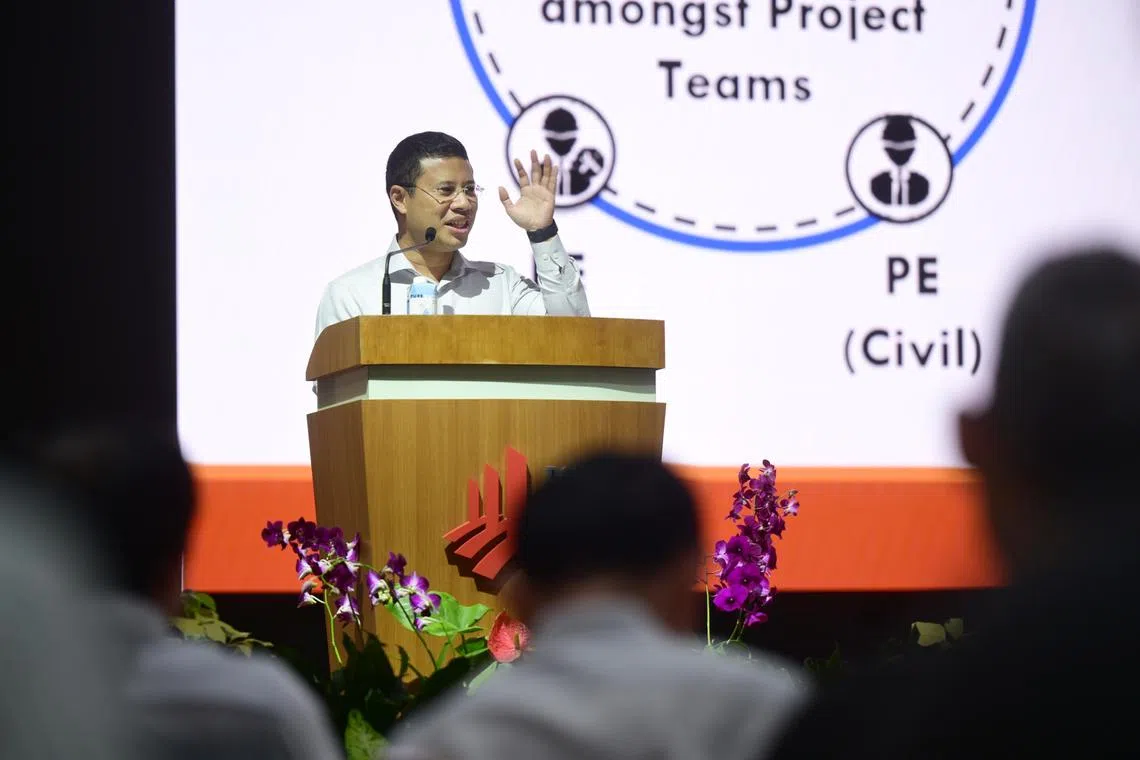Up to $53 billion in construction contracts expected in 2025: BCA
Sign up now: Get ST's newsletters delivered to your inbox

National Development Minister Desmond Lee speaking at a BCA-Redas seminar held at the BCA Academy on Jan 23.
ST PHOTO: AZMI ATHNI
SINGAPORE - Some $47 billion to $53 billion in construction contracts are expected to be awarded in 2025, as construction demand grows this year, said the Building and Construction Authority (BCA) on Jan 23.
This is higher than the estimated $44.2 billion in contracts in 2024, said BCA, which attributed the anticipated increase to the launch of major public infrastructure projects and development of public and private housing.
To seize the opportunities from these projects, National Development Minister Desmond Lee also called on developers, consultants and builders to collaborate more closely.
Among the projects driving demand in 2025 are upgrading works for public housing, construction of Changi Airport Terminal 5 and the expansion of Marina Bay Sands, said BCA.
The authority expects total construction demand from 2026 to 2029 to reach an average of between $39 billion and $46 billion each year.
Over the medium term, construction demand will be supported by developments such as MRT projects – including phase three of the Cross Island Line and the Downtown Line extension to Sungei Kadut – and public housing developments.
Overall industry demand could moderate after the construction of Changi Airport Terminal 5 is completed in the mid-2030s, said BCA.
Against this backdrop, the authorities have been pushing developers, construction firms and consultants to transform and boost productivity through greater digitalisation, adopting robotics and automation
The authorities are also moving to streamline the approval processes for construction projects through its CoreNet X platform.
From October, Mr Lee said, it will be mandatory for parties involved in projects to make regulatory submissions through the platform for all new projects with a gross floor area of at least 30,000 sq m.
This will be compulsory for all new projects, regardless of size, from October 2026. Finally, all ongoing projects must be moved onto the platform by October 2027.
The CoreNet X platform, which was soft-launched in December 2023, streamlines the approval process to three stages via a single platform, rather than through multiple agencies.
It is expected to cut the time taken for construction projects to obtain approval from government agencies by about 20 per cent.
Under the old submission process, plans approved by one government agency may be in conflict with the requirements of another agency, or result in conflicts between project parties that would need to be resolved during construction.
Speaking at a BCA-Redas (Real Estate Developers’ Association of Singapore) seminar held at the BCA Academy, Mr Lee said the authorities will roll out the mandatory use of CoreNet X in phases, recognising that the industry needs more time to adjust internal processes and familiarise themselves with the new requirements.
“One of the key lessons we have learnt is that no amount of workshops and training courses can beat trying out CoreNet X with live projects, in helping companies get ready,” Mr Lee said.
Since the platform was opened to voluntary submissions in June 2024, 28 projects involving 72 firms across various development types have come on board, he said.
All submissions from these projects were processed within 20 working days and approvals were issued within two iterations.
Addressing concerns from developers about project delays due to a lack of familiarity with the new requirements, Mr Lee said the authorities introduced a six-month extension to Additional Buyer’s Stamp Duty remission and project completion period timelines to give practitioners more time to learn the new processes.
To help smaller firms, he added that the Productivity Solutions Grant was expanded to co-fund up to 50 per cent of software costs and CoreNet X training.
Singapore Institute of Architects president Melvin Tan said that with CoreNet X, firms would have to coordinate and make decisions early on in the project pipeline, which would reduce conflict downstream.
“Everything is consolidated to the same model, rather than submitting separate 2D drawings to different agencies and having to update them concurrently,” he said.
Mr Jeffrey Wong, general manager of projects at Wing Tai Property Management, said CoreNet X helped to improve efficiency in the approval process for its River Green condominium in River Valley, but added that the firm had to submit supplementary drawings.
The approval process for the development took about 12 to 15 months, on a par with other projects that do not use CoreNet X.
“The platform is still in its infancy and the authorities have been proactive in hearing our feedback and resolving the teething issues,” he added.
Isabelle Liew is a journalist at The Straits Times. She covers housing issues in Singapore, with a focus on public housing.


